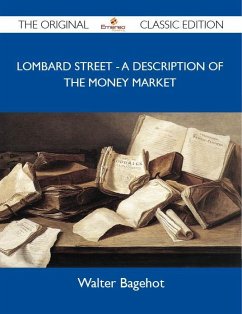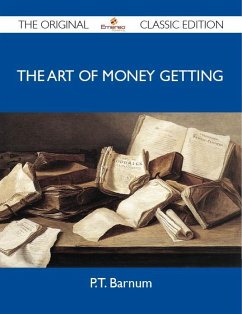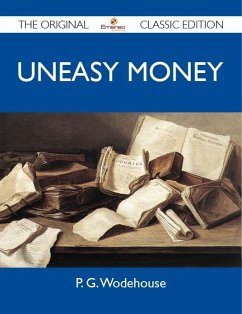Lombard Street - A Description of the Money Market by Walter Bagehot - The Original Classic Edition
Finally available, a high quality book of the original classic edition.
This is a new and freshly published edition of this culturally important work, which is now, at last, again available to you.
Enjoy this classic work today. These selected paragraphs distill the contents and give you a quick look inside:
If Lombard Street were on a sudden thrown into liquidation, and made to pay as much as it could on the spot, that 2,000,000 L. would be all which the Bank of England could pay to the depositing banks, and consequently all, besides the small cash in the till, which those banks could on a sudden pay to the persons who have deposited with them.We see then that the banking reserve of the Bank of England-some 10,000,000 L. on an average of years now, and formerly much less-is all which is held against the liabilities of Lombard Street; and if that were all, we might well be amazed at the immense development of our credit system-in plain English, at the immense amount of our debts payable on demand, and the smallness of the sum of actual money which we keep to pay them if demanded.
...The result is that we have placed the exclusive custody of our entire banking reserve in the hands of a single board of directors not particularly trained for the duty-who might be called amateurs, who have no particular interest above other people in keeping it undiminished-who acknowledge no obligation to keep it undiminished who have never been told by any great statesman or public authority that they are so to keep it or that they have anything to do with it who are named by and are agents for a proprietary which would have a greater income if it was diminished, who do not fear, and who need not fear, ruin, even if it were all gone and wasted.
...If we ask how the Bank of England has discharged this great responsibility, we shall be struck by three things: first, as has been said before, the Bank has never by any corporate act or authorised utterance acknowledged the duty, and some of its directors deny it; second (what is even more remarkable), no resolution of Parliament, no report of any Committee of Parliament (as far as I know), no remembered speech of a responsible statesman, has assigned or enforced that duty on the Bank; third (what is more remarkable still), the distinct teaching of our highest authorities has often been that no public duty of any kind is imposed on the Banking Department of the Bank; that, for banking purposes, it is only a joint stock bank like any other bank; that its managers should look only to the interest of the proprietors and their dividend; that they are to manage as the London and Westminster Bank or the Union Bank manages.
...Is that from a feeling that it is rather dangerous under particular circumstances?-I cannot admit as to its being dangerous, but there can be no doubt of this, that there is a notion in the public mind which we ought not to contend against, that when you offer a high rate of interest for money, you rather do it because you want the persons money, than because you are obeying the market rate; and I think it is desirable that we should show that if persons wish to employ their money, and want an excessive rate, they may take it away and employ it themselves.
Finally available, a high quality book of the original classic edition.
This is a new and freshly published edition of this culturally important work, which is now, at last, again available to you.
Enjoy this classic work today. These selected paragraphs distill the contents and give you a quick look inside:
If Lombard Street were on a sudden thrown into liquidation, and made to pay as much as it could on the spot, that 2,000,000 L. would be all which the Bank of England could pay to the depositing banks, and consequently all, besides the small cash in the till, which those banks could on a sudden pay to the persons who have deposited with them.We see then that the banking reserve of the Bank of England-some 10,000,000 L. on an average of years now, and formerly much less-is all which is held against the liabilities of Lombard Street; and if that were all, we might well be amazed at the immense development of our credit system-in plain English, at the immense amount of our debts payable on demand, and the smallness of the sum of actual money which we keep to pay them if demanded.
...The result is that we have placed the exclusive custody of our entire banking reserve in the hands of a single board of directors not particularly trained for the duty-who might be called amateurs, who have no particular interest above other people in keeping it undiminished-who acknowledge no obligation to keep it undiminished who have never been told by any great statesman or public authority that they are so to keep it or that they have anything to do with it who are named by and are agents for a proprietary which would have a greater income if it was diminished, who do not fear, and who need not fear, ruin, even if it were all gone and wasted.
...If we ask how the Bank of England has discharged this great responsibility, we shall be struck by three things: first, as has been said before, the Bank has never by any corporate act or authorised utterance acknowledged the duty, and some of its directors deny it; second (what is even more remarkable), no resolution of Parliament, no report of any Committee of Parliament (as far as I know), no remembered speech of a responsible statesman, has assigned or enforced that duty on the Bank; third (what is more remarkable still), the distinct teaching of our highest authorities has often been that no public duty of any kind is imposed on the Banking Department of the Bank; that, for banking purposes, it is only a joint stock bank like any other bank; that its managers should look only to the interest of the proprietors and their dividend; that they are to manage as the London and Westminster Bank or the Union Bank manages.
...Is that from a feeling that it is rather dangerous under particular circumstances?-I cannot admit as to its being dangerous, but there can be no doubt of this, that there is a notion in the public mind which we ought not to contend against, that when you offer a high rate of interest for money, you rather do it because you want the persons money, than because you are obeying the market rate; and I think it is desirable that we should show that if persons wish to employ their money, and want an excessive rate, they may take it away and employ it themselves.
Dieser Download kann aus rechtlichen Gründen nur mit Rechnungsadresse in A, D ausgeliefert werden.









